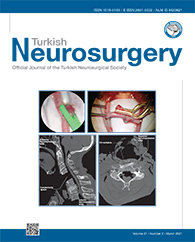2Dr. Lutfi Kirdar Kartal Research and Training Hospital, Neurosurgery Clinic, Istanbul, Turkey
3Uludağ University School of Medicine, Department of Neurosurgery, Bursa, Turkey
4Balikesir University School of Medicine, Department of Pathology, Balikesir, Turkey DOI : 10.5137/1019-5149.JTN.32092-20.1 AIM: To investigate the effects of different radiation doses on the development of the neural tube defect in chick embryos using computed tomography (CT), and assess its correlation with survivin and Bcl-2 expressions.
MATERIAL and METHODS: A total of 150 chicken eggs were used and grouped into five categories. In Group 1 (n=30), the embryos were not exposed to radiation. In Group 2 (n=30), the embryos were irradiated using lung cancer screening chest CT protocol. In Groups 3 and 4 (n=30 each), the abdominopelvic and adult routine head CT protocols, respectively, were used to irradiate the embryos. In Group 5 (n=30), the embryos were irradiated using adult brain perfusion CT protocol. Subsequently, the embryos were examined under a stereomicroscope to assess the presence of neural tube developmental abnormalities. Moreover, immunohistochemical staining was performed to determine the survivin and Bcl-2 expression levels.
RESULTS: The risk of developing neural tube defect increased with the amount of exposed radiation. Moreover, no significant correlation was observed between the survivin and Bcl-2 expression levels and the radiation dose.
CONCLUSION: Overall, the results of this study indicate that the radiation from CT may cause neural tube defect in chicken embryos.
Keywords : Bcl2, Chicken embryo, Neural tube defect, Radiation, Survivin




